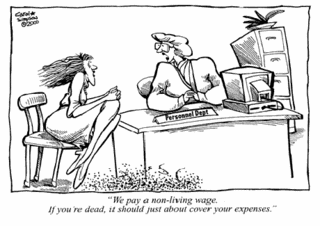on wages and social justice

“The modern conservative is engaged in one of man's oldest exercises in moral philosophy; that is, the search for a superior moral justification for selfishness.”
-John Kenneth Galbraith
Raising wages will price low-skilled workers out of the labor market. This is an argument made by opponents of
Their argument is based on a simple and unavoidable fact: higher wages mean that it is more expensive to employ people. True enough. However, to move from that basic fact to an argument for keeping wages low is big step, one fraught with misconceptions and conservative ideology. The case for low wages is built on the existence of a permanent underclass of workers, a two-tiered society in which some sectors of the population are caught in a trap of poverty and dependence.
Consider
But it is not. It is not better to hire a few more people and stick them in an underclass. It is better social policy to raise people out of poverty permanently by allowing them to work one job, allowing them to spend time on educating themselves and their children and move into the middle class. It is better social policy to have one community, not two.
Setting aside the attendant social problems with sustaining an underclass- crime, homelessness, drug abuse, congestion, increased demand for underfunded public assistance, etc- there is a fundamental economic miscalculation at play. Workers are also consumers. Earning a living wage allows workers to spend money in local shops, go to movies, buy clothes and rent single-family apartments. On a national scale, lifting people out of poverty creates more consumer demand, a boon for businesses of all sizes. In essence, the situation in
There is also a problem with the delination of "skilled" vs. "unskilled" workers. Many people working low-wage jobs are, in fact, quite skilled. Barriers of language, discrimination, as well as rules disregarding foriegn educational qualifications keep many immigrant workers from plying their trade after moving here. How many of you have met a Cab Driver or Janitor with a degree in engineering? Perhaps more relevantly, people are doing skilled work for low pay- just ask anyone in the construction trades. The drive to push wages down is a function of the power of employers, not a free-market of skills and experience. So long as people are desperate enough to work for poverty wages, employers will pay poverty wages. Unless something- a union, a law, a pricked conscience- intervenes. Furthermore, we shouldn't think of the "unskilled" as a permanent class of worker- everyone can become "skilled". This is a lot harder when you are working two jobs.
Looking more broadly, one must ask where, exactly, argument for low wages ends. Sure, Nike’s subcontractors can hire a lot more workers if they are able to pay fifty cents a day and chain workers to sewing machines. Cleaning up sweatshops in 1900’s
High wages and regulated labor markets to not necessarily lead to high unemployment. So long as full employment remains a real political goal, and macroeconomic tools are used to achieve it, a nation can have both high wages and keep its citizens working. This was the hallmark of post-war Swedish economic policy, and it was executed with great success. Despite distortions by conservatives who love to whip
The Swedish trick is to guide the economy toward employment, with incentives for job-creating investment, a robust public sector and commitment to education, skills-training and domestic consumption. All of this was achieved with relatively high wages and a strong social safety-net for workers finding themselves between jobs. While
I began this post with the quote from Galbraith because of his consistent opposition to wooly-headed economic thought. Galbraith was always quick to point out that it seemed a nifty convenience that the economic “truths” proclaimed by the rich so often justified their enrichment. We should use the same skepticism in assessing the claims by local employers, their friends and politicians who benefit from their largesse.






0 Comments:
Legg inn en kommentar
<< Home